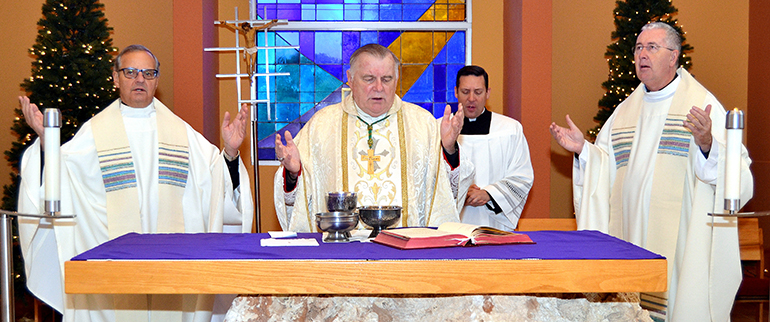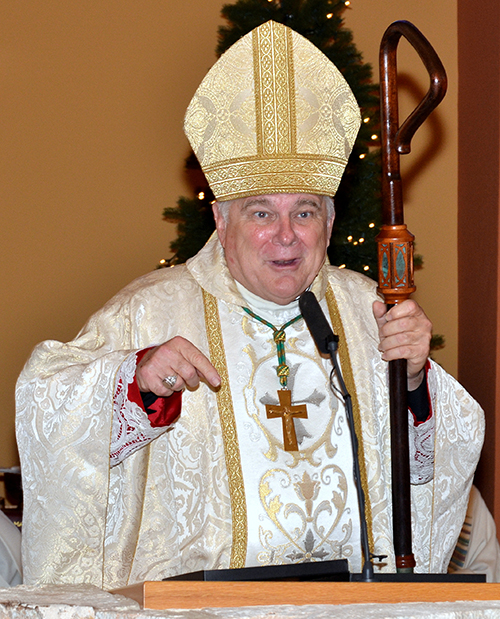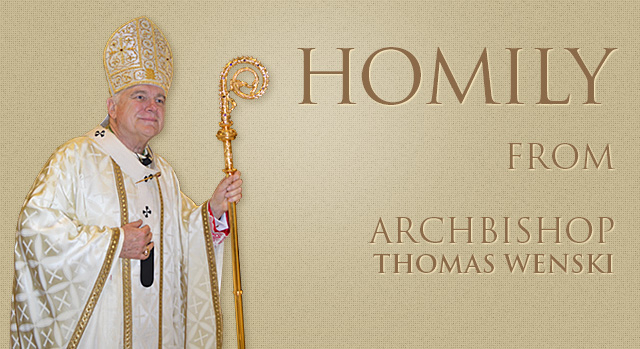By Archbishop Thomas Wenski - The Archdiocese of Miami

Photographer: JIM DAVIS | FC
Archbishop Thomas Wenski, center, concelebrates Mass with St. Thomas University leaders. At left is Msgr. Franklyn Casale, university president; at right is Msgr. Terence Hogan, dean of the School of Theology and Ministry.
Homily by Archbishop Thomas Wenski at Mass for the 70th anniversary of St. Thomas University. Dec. 11, 2016.
Today we gather to celebrate the 70th anniversary of La Universidad de Santo Tomas de Villanueva. This school, which was originally known as Villanueva, was first planted in Habana, Cuba in 1946; then in 1961, uprooted by the Cuban revolution, it was transplanted here in Miami, first as Biscayne College and then over the years it grew into what today is St. Thomas University. “Bienvenidos a los antiguos alumnos”.
The history of this school mirrors the history of many of its students � many of whom are also “transplants” from other nations and cultures. St. Thomas University has been “good soil” for these “transplants” � for, because of the education they received at St. Thomas, our students have not only grown; they have flourished. And we see the fruits in the many positive contributions our alumni are making to the communities in which they live.
And so today, alumni from the Havana campus gather with alumni and students from our Miami campus � and it is only fitting that we begin our celebration of this anniversary with Holy Mass, the highest form of Catholic prayer. Prayer is not the last recourse of the desperate � although one might get that impression around exam time; rather, it is the prime resource of the hopeful. For prayer is the lifting up of our minds and hearts to God.

Photographer: JIM DAVIS | FC
Archbishop Thomas Wenski preaches the homily at the 70th anniversary Mass for St. Thomas University.
Prayer, for a Christian, is not self-absorbed navel gazing, rather it is the opening of ourselves to transcendence, to an encounter with the Infinite and Ever-Living God who has revealed himself in Jesus Christ as our Way, our Truth, and our Life.
The wisdom that comes from revealed faith and the wisdom that comes from human learning are not necessarily incompatible � as is sometimes thought in this post-modern age in which we live. Often we find those who feel that they must deny reason for the sake of their faith � faith for these people at best is reduced to empty sentimentality; at worst, a facile justification for murderous ideologies.
And just as often, we can find those � especially among the denizens of the ivied halls of academia � who feel that they must deny faith for the sake of reason. Reason for these people is reduced to vain pedantry and conceited sophistry. Pope Benedict once said: “Anyone who excludes God from his horizons falsifies the notion of reality and�can only end up in blind alleys or with recipes for destruction.”
The closing of Santo Tomas de Villanueva in 1961 certainly was an attempt to exclude God from Cuba’s horizons � and the truth of Pope Benedict’s words is illustrated in the history of Cuba after the so called “triumph of the revolution.”
The scholar-pope, Benedict XVI, also wrote in Spe Salvi, “A world without God is a world without hope; it is a world without a future.” But where God is, there the future is. If once the world was threatened by the ideological materialism represented by Marxist-Leninism, today it is threatened by the practical materialism increasingly dominant in the secularized West. If the ideological materialism of Marxism denied that God exists, the practical materialism asserts that he doesn’t much matter. But both ideologies can only lead us up blind alleys � for both, by seeking to close the human heart and mind to the possibility of transcendence � which is ultimately the calling, or vocation, of every human person � they close the human heart and mind to a future, a future of hope.
Such falsified notions of reality are at the heart of the crisis of modern humanism which has lost faith not only in God but in human reason itself. It is expressed in the moral relativism that already made great inroads in our popular culture � a relativism that holds that truth can be what we say it is and not what it is in itself.
As the Catholic intellectual and philosopher, Michael Novak, writes:
“A commitment to relativism means that reason is ultimately irrelevant, that there is only preference. In such a world, power trumps. The thugs will win. It will be no good protesting that what they do is unjust ('says who?'), or morally culpable ('oh yeah?'), or a tissue of lies ('say you'). Only a commitment to concrete truths, to argument in the light of evidence, makes humans free. Why? Because civilized people regard one another as reasonable and free and wish to persuade one another only in the light of evidence. Barbarians use clubs.”
But to oppose faith and reason is to create a false dichotomy � as Pope St. John Paul II wrote: “Reason and faith cannot be separated without diminishing the capacity of men and women to know themselves, the world and God in an appropriate way.”
As Catholics, we believe that truth is one. In that sense, there can be no real contradiction between belief and science, between faith and reason. The so-called “contradictions” that some would allege are only apparent ones that can be resolved through honest and reasonable inquiry.
As Catholics we believe in both the value and power of faith and the value and power of reason. Pope John Paul II said: “Faith and reason are like two wings on which the human spirit rises to the contemplation of truth; and God has placed in the human heart a desire to know the truth � in a word, to know himself � so that, by knowing and loving God, men and women may also come to the fullness of truth about themselves.”
This “coming to the fullness of truth about God and ourselves” is really a great description of what an academic pursuit that aspires to call itself “higher education” should be about. In a time when people are tempted to think “that it’s all about me,” an education in the Catholic tradition reminds us that the path to self-realization and true happiness is not found through self-seeking but through self-giving. The purpose of an education is not for us to “get more” but to help us “be more.”
To know the fullness of truth about God and ourselves was what led the Augustinian Fathers to found Santo Tomas de Villanueva in Havana some 70 years ago. “Transplanted” here to Miami at the invitation of my predecessor, Archbishop Coleman Carroll, the work of those fathers was not lost but found “good soil” here in South Florida to continue to flourish.
The Church, as she has through her history, wishes that her faith, through reasoned dialogue, will shape the culture in which she lives � so that the culture may become more worthy of man. God willing, may this institution also once again help shape the culture in the soil in which it first took root. For, where God is, there the future is.

